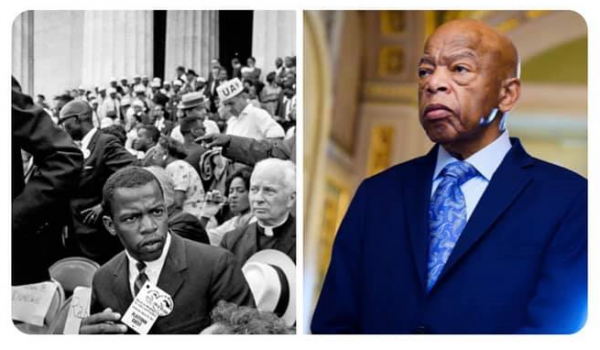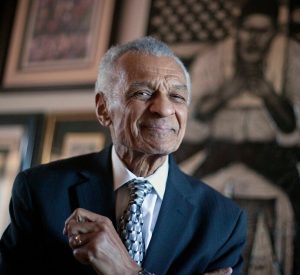.
.
.

Former Rep. John Lewis, shown young and old, proponent of the moral responsibility to make “good trouble, necessary trouble.”
Two giants of the civil rights era have died in less than a day. One you’ve likely heard of; one you likely haven’t.
Rep. John Lewis of Georgia famously led the march across the Edmund Pettis Bridge in Selma, Alabama, straight into the maw of a hate-filled police force intent on what we delicately call “excessive use of force.” He died Friday, at age 80, of pancreatic cancer.
An amazing quote by Rep. Lewis, which I’m swiping from a friend on another site, would qualify him as the patron saint (were he canonized, which is not our department here) of good folks in OC:
You must find a way to get in the way and get in trouble — good trouble, necessary trouble. … You have a moral obligation, a mission and a mandate, when you leave here, to go out and seek justice for all. You can do it. You must do it.
Those words he spoke on the Edmund Pettis Bridge, before he led the march into bad trouble the bad trouble of Selma, trouble that was also very good. It was, by the way, about voting rights, so you can’t really admire both this year’s Supreme Court and John Lewis. Pick a side.
The other death was almost a generation older, enough so to be within the inner circle of the Rev. Martin Luther King, Jr., rather than an acolyte. This was the Rev. C. T. Vivian, who also died yesterday at age 95. As the linked story describes:
In Selma and Birmingham, Ala.; St. Augustine, Fla.; Jackson, Miss.; and other segregated cities, Mr. Vivian led sit-ins at lunch counters, boycotts of businesses, and marches that continued for weeks or months, raising tensions that often led to mass arrests and harsh repression.
Televised scenes of marchers attacked by police officers and firefighters with cattle prods, snarling dogs, fire hoses and nightsticks shocked the national conscience, legitimized the civil rights movement and led to passage of the Civil Rights Act of 1964 and the Voting Rights Act of 1965.
“Nonviolence is the only honorable way of dealing with social change, because if we are wrong, nobody gets hurt but us,” Mr. Vivian said in an address to civil rights workers, as recounted in “At Canaan’s Edge: America in the King Years, 1965-68” (2006), by Taylor Branch. “And if we are right, more people will participate in determining their own destinies than ever before.”

C. T. Vivian
It also notes that in the same city and year where Rep. Lewis’s skull was fractured by a club on the bridge to Selma, Rev. Vivian’s was punched in face by its Sheriff, tumbling down a set of courthouse steps — after which he was immediately arrested for provoking the attack. He was also once almost drowned by racist vigilantes while trying to integrate a segregated Florida beach — and risked his life far many more times than those two.
The Times doesn’t record what thoughts Rev. Vivian had about this year’s Black Lives Matters movement, but it reports that Rep. Lewis was gratified and enthused about it, especially the diversity of its participants and supporters.
There were giants in those days, and we’ve now lost two of them, who lived good long lives but will not themselves reach the mountaintop. What a difference from those who, in a time of crisis, feel too inconvenienced even to wear a face mask to protect those around them.
This is your Weekend Open Thread. Talk about that or whatever else you’d like, heeding (if you can) the principles of nonviolence, and getting into (if you can) some good trouble, here and beyond.







Well this is appropriate, from 6 years ago… though I know Greg hates the song…
“Did he say ‘a room without a roof?'”
*John Lewis has left the table too early for our liking. We would have at least prayed that he had made it passed Novemeber 3rd, 2020. Whatever results, now he has to look from afar and hope his family and friends and collegues will voice he thoughts …with whatever outcome occurs. We loved John Lewis, because he had focus and heart. A noble combination for an elected politician. We are sincerely sorry for the Country’s loss at this pivotal time in American History.
Just a reminder of two events significant for today:
(1) Today is the 41st anniversary of Apollo 11’s landing on the moon.
(2) Today it has been exactly 42 months since Donald Trump was sworn in to the Presidency.
That time period is of special interest to Christians, given its prominence in the Book of Revelation Chapter 13, which describes the reign of two Beasts: the Antichrist, who comes from the sea and reigns for 42 months, and the False Prophet, who follows him, believers and forcing the “Mark of the Beast” upon those who would buy or sell. (And, of course, lots worse than that/)
Non-religious scholarly opinion seems to think that John of Patmos was referencing the Roman Emperor Nero, last of the Julian-Claudian line, and the first Roman Emperor to persecute Christianity — which lasted 42 months at the beginning of his reign.
Look: I’m no Biblical scholar (least of all New Testament), but this “prererist” view (that at least the discussion of the first Beast was based on recent political history) seems pretty reasonable. And, at any rate, the current occupant of the Oval Office doesn’t really seem cut out for that role anyway — being much more the False Prophet/Great Deceiver type (who does most of the things, like imposing the Mark of the Beast, usually associated with the Antichrist.) This would put him right around — or perhaps even within — the seven-year period (given the interpretation of “Daniel’s Weeks” as each referring to a seven-year period) known as the Tribulation.
There are various theories about what happens when during the Tribulation, but so far as I can tell the dominant view seems to be “midtribulationist,” which sets the time of the Rapture of good Christians as occuring halfway through the period, the point at while Many Very Bad Things turns into Extremely Awful Things — the first of which is a swarm of locusts with human heads and the stings of scorpions, who kill you very slowly.
So look — I’m not saying that any of this is true. I’m just saying that there’s a prophecy of a beastly man who worships unbridled power, roars like a lion, etc. who lasts in power for seven years, halfway through gaining the advantage of all of the really good Christians ascending to Heaven, from where they cannot vote, followed by awful stuff you don’t even want to know about — including, at its end, the battle of Armageddon.
If you happen to be driving later today — especially at 9 am, the time at which Trump became President — just be aware of the possibility of cars spinning out of control without their drivers and scorpion locusts coming after you. I’m not saying it’s going to happen! (The scripture says that no one knows the day of the end times.) I’m just saying: be a little bit more careful than otherwise today.
Noon Pacific time and all seems well.